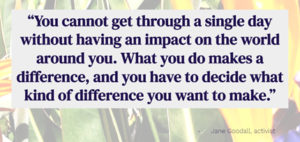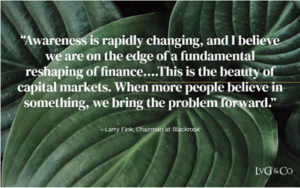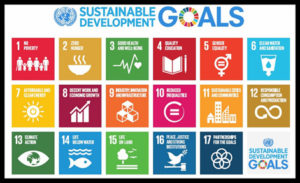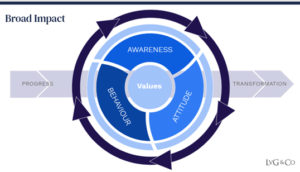In our 3-part series on ‘the value of values’ so far, we’ve defined: what values are, how they’re used, how a company can identify its values, and how to commit to them with action. Today, we’ll close out the series by looking at the positive impact that results from ‘walking the talk.’

The proverbial ‘value of values’ is all about when our beliefs and actions come together to deliver results. Broadly, it’s about the amazing outcomes we can achieve when guided by and committed to our values.
In a global business context success can be measured by individual, organizational and governmental impact. Collectively too, pursuing shared values supports a virtuous cycle of positive, systems-level impact – something the world today needs as much as ever.
Individual Impact
“Your values are a major determinant of your choices, decisions, and transitions.”
That’s me, roughly paraphrasing Dan Gilbert, Harvard professor and author of Stumbling on Happiness. We know this sentiment is true at a personal level; it’s also relevant in terms of the dual roles we play as individuals in business.
- Consumer: By selecting products and services that support our values – we take action with our wallets. An example of consumer impact is the radical upward trend in plant-based food over the past decade. As people become more educated on the planetary and [likely] health-related impacts of a diet overly rich in animal proteins, alternative meat and dairy options have risen to better meet consumer demand. Some points of evidence below.
- Grocery: Amazon’s 2017 acquisition of Whole Foods marked a major transition from ‘health food’ as niche to mainstream; now, every store around the world offers a cadre of ‘better-for-you’ products – both branded and private label – that until recently were only found at specialty stores.
- CPG: Entrants like Oatly and Beyond Meat are but two examples of fast-growing businesses built around new category creation; meanwhile, Danone’s 2016 acquisition of plant-based WhiteWave set it up to become the world’s largest B-Corp.
- Restaurants: Vegetarian and vegan ‘lifestyle’ plays like Dig Inn and Sweetgreen have raised hundreds of millions in VC funding, allowing them to rapidly expand across the US in recent years, with similar trends in fast casual happening globally.
- Employee: Employee activism was long the bastion of organized labor, where trade unions focused on worker protection and fair dealing for members. Increasingly, however, employees from all walks of life are inclined to take joint action in support of their beliefs. Whether standing up for what’s ‘right’ or ‘just’ like the brave women of #metoo – or speaking out for what’s ‘fair’ or ‘enough’ as we’re seeing from so many ‘gig economy’ workers deemed ‘essential’ during this COVID19 health pandemic – we see how progress can be multi- dimensional and often hard fought. Yet, individual employees committing to their values yields a net positive global impact.
Organizational Impact
There are many metrics to be considered when measuring global business impact from an organizational perspective. At the corporate and investor level, there are the obvious financial markers: revenue, profit, EBITDA, dividends, capital raised, multiples, ROI, etc. When looking through a values-based lens, these do not change, but are simply amplified. How do we know?
- Corporate: In recent years, CSR/ESG has become an integral part of the modern corporation. Seen as a key differentiator among employees and customers, it is also a proven means for delivering lasting business performance. We observe this effect by looking at a few mission-driven success stories.
- Tesla: In reimagining a car within a broad ecosystem of safety, environment and experience – founder, Elon Musk took the company from selling its first car in 2008, to a $93 billion valuation in January 2020 – $6B higher than heritage competitors, Ford and General Motors combined.
- Warby Parker: Founded with a mission of “..leading the way for socially conscious businesses”, the company claims to have provided over 7 million pairs of glasses to vision-impaired persons around the world through its ‘Buy a Pair, Give a Pair’ program.
- Unilever: Former CEO, Paul Polman, says he was given permission to pursue the bold objective of doubling revenues while cutting the company’s negative environmental effects in half, because “people would say, ‘yeah, he’s bringing back values that were at the roots of the success of this company.”
- Beautycounter: Since its founding, the D2C clean-label beauty and skincare brand has not only helped tens of thousands of households clean up their personal care routines, it has successfully lobbied the US government to consider increased personal-care product safety, a long-ignored consumer protection.
- Investor: If modern society believes in nothing else, it’s that ‘money talks’. So the following examples from key banks, asset managers, and trade groups should shed light on the growing relevance of values in investment models.
- ‘Impact Investing’ or ‘Socially Responsible Investing’ (SRI): In 2019, investors put $20.6 billion into funds focused on environmental, social and governance issues, nearly quadruple the year prior; this contributes to nearly $30 trillion currently in ESG investments globally, a figure expected to double in the next twenty years.
- Business Roundtable: The organization representing nearly 200 of America’s largest corporations, issued a statement last August, revising “the purpose of a corporation” – suggesting that among other elements, the focus should be on “generating long-term value for [all of its] shareholders”.
- Goldman Sachs: Based on growing pressure, as well as clear data showing elevated performance by companies with females in significant leadership roles – the investment bank has taken a first step in mandating gender diversity quotas at the C-suite and Board level for any company they take public.
- Blackrock: At Davos this year, the CEO introduced key actions around using the world’s largest asset management platform as a tool to combat climate change.
Governmental Impact
The importance of oversight and shared resources cannot be understated. As values continue to grow in importance to global business, accrediting organizations, plus local and federal governments play an important role. Over time, international cooperation and public-private partnerships too will be needed.
For now, what we’re seeing is a rise in guidance – such as from the UN, whose Sustainable Development Goals 2030 outline 17 key areas of impact the world needs to collectively tackle. In turn, these efforts are supported by NGOs like supply chain overseer Fairtrade International, philanthropic sustainability amalgamator 1% for the Planet, the benefit corporation accrediting body, B Lab, among hundreds of others looking to support a common belief in ‘business as a force for good.’
By building common definitions, resources, and tools – these organizations make it easier for interested businesses to learn, access information, and collaborate in making a positive impact on the world we share.
Closing
Values matter. Values lead. They are our internal compass, our lens and vision. Values have the power to spark awareness, change attitudes, and inspire action that lead the transformation from where we are to where we want to go. The ‘value of values’ is about contributing to positive systemic change, to doing better at both micro and macro levels.
We’ve seen so much progress along these lines in recent years. Imagine what is possible if everyone let their values lead? Imagine where the world could move?
There is a growing sense of urgency; a growing demand for positive action around a host of issues. As a result, the relevance of values is growing too – among individuals, organizations, and governments. How we identify our values, take action, and stay committed will impact outcomes and the hopefully positive impact we can make on the world we share.
This post was written and contributed by:
Lisa Gralnek
Principal & Founder, LVG & Co.
An expert brand builder and changemaker, Lisa has spent more than twenty years creating and executing growth strategies for leading fashion, retail, and CPG brands, along with diverse start-ups, SMEs and nonprofits. Dedicated to helping values-led brands grow and innovate, she believes fundamentally in the power and responsibility of each of us to do better- for ourselves and the world we share. Lisa holds a BA in Political Science and French, and an MBA from INSEAD. Learn more at www.lvg-co.com.




